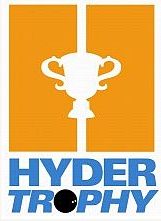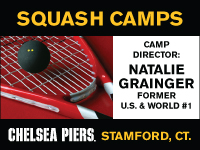Hyder Semis: Razik And El Hindi Surge Into Rematch Of 2007 Final
by Rob Dinerman, for DailySquashReport.com

Dateline May 19th, 2012 --- For the fourth straight year, and the sixth time in the past decade, PSA No. 34 Shahier Razik has made it into the final round of the Quentin Hyder Invitational. A three-time champion (in 2003, 2006 and 2010, with final-round wins over Peter Genever, Graham Ryding and Scott Arnold respectively), the almost preternaturally graceful Canadian star has played some of his best squash in this popular annual New York City tournament, now in its 44th holding, and this year has been no exception, as he has defeated, sequentially, Shahid Khan, Bradley Ball and (in the semifinals this afternoon) PSA top-40 Zac Alexander, the young strapping Australian currently based in Westchester, who carried the play throughout many of the exchanges, displaying a game with plenty of punch and pace, yet still could garner no more than 8, 7 and 5 points in the face of his Razik’s experience, shot selection and, most of all, relentless court coverage.
This latter trait against all but the top PSA guns can be historically counted on to create fatigue, frustration and (frequently) late-game tins for Razik’s opponents, who often summon some of their best output to push a game to its latter stages, only to have their concentration too worn down by then to maintain that level at the very end. It was exactly this fate that befell Alexander in the first game, when at 8-all, after playing beautifully to get to that juncture, he first hit a wayward backhand drive right back at himself for a stroke, then tinned a backhand working-boast in an attempt to wrong-foot Razik, and finally lashed a backhand cross-court into the tin as well.
Chastened by this brief but costly lapse of focus that had doomed his effort to win that opening game, Alexander came up with his best squash of the day in gaining a small and hard-earned lead in the second, smashing balls into the sidewall nick, cutting balls off at the midline and throwing his well-conditioned body into the corners in pursuit of Razik’s probing shots. When a no-let call against Razik got Alexander (who had hit a shallow wall-hugging backhand rail) to 7-5, he was playing so well that no one could have suspected that none of the next 12 points would land in his column. Razik’s match-clinching skein when he drew Alexander to the front-left and laced a forehand drive down the open right wall for 6-7, following which Alexander tinned the subsequent serve-return. Irritated at how swiftly the two-point margin had disappeared, Alexander abandoned the patient accumulation of small advantages that had been serving him so well and instead rashly went for quick winners that instead resulted in four consecutive tins (albeit in some cases after a strenuous point) and the loss of that second game.
Razik’s consecutive-points streak, as noted, extended all the way to 6-0 in the third game, again abetted by a quartet of Alexander tins. The score eventually grew to 9-1 before Alexander buried several backhand cross-court volleys into the front-right nick, too little, too late by then, and the match ended with a delicate Razik backhand straight-drop (a shot that Razik has noticeably improved from last year to this) that Alexander was unable to scoop back into play.
Razik’s opponent Sunday afternoon at the host Sports Club/LA venue will be a long-time adversary in recently-retired PSA stand-out Wael El Hindi, who prevailed, although barely (11-9 in the fifth) when this pair met in the 2007 Hyder final, played back then at the Eastern Athletic Club in Brooklyn, one of two Hyder finals (also in 2011, when Alister Walker, trailing 14-13 in the fifth game, won three straight points) in which Razik has fallen two points short of victory. El Hindi, after dropping the opening game to Ryan Cuskelly’s shot-making skills, picked up the pace the rest of the way and controlled the action enough to earn a 7-11 11-6 11-4 11-4 win. The Razik-El Hindi final five years ago had been marred by severe clearing problems along the left wall, too many arguments with the referee and angry gesticulations to be esthetically appealing, but a repeat performance is not expected this time around, and both contestants are playing at a high enough level to make for a match rich in virtuosity and entertainment value.
Other finals of note include the women’s pro final between five-time U. S. National Champion Natalie Grainger (who defeated Kelsey Engman in the semifinal of this four-player event) and seven-time U. S. National Champion Latasha Khan, who in her semi duplicated the success she had had against Meredeth Quick in the 2002, 2004 and 2005 U. S. Nationals finals. The Men’s 6.0 final will match Columbia head coach Jacques Swanepoel against high-school senior Faraz Khan after their semifinal wins over William Cheng and John Musto respectively. Engman, Quick and Khan (as well as Ethan Buchsbaum) were announced prior to the pro semifinal matches as the recipients of the four postseason awards that the host association, New York Squash (formerly known as the Metropolitan Squash Racquets Association) bestows.
DRAW
Back To Main


